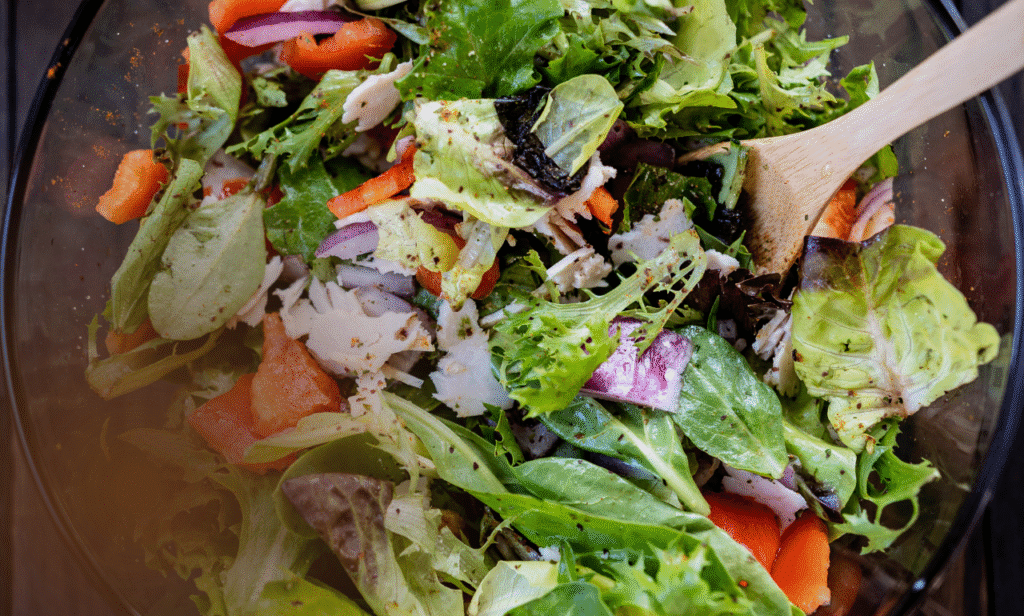
photo/Getty image
The simple act of eating a salad every day is often hailed as a cornerstone of healthy living. But beyond the general notion that it’s “good for you,” what are the actual, tangible effects on your body? Incorporating a daily salad, especially one built with nutrient-dense ingredients, can trigger a cascade of positive physiological changes. From improved digestion to a healthier heart, let’s explore the science-backed transformations you can expect when you make this powerful dietary habit a part of your routine.
1. You Flood Your Body with Essential Micronutrients
A daily salad is one of the most efficient ways to consume a broad spectrum of vitamins and minerals. Dark, leafy greens like spinach and kale are rich in vitamin K for bone health and blood clotting, vitamin A for vision and immunity, and folate for cell growth. Adding vegetables like bell peppers, tomatoes, and carrots introduces a potent dose of vitamin C, a critical antioxidant, and various B vitamins.
What happens to your body? This micronutrient boost supports countless enzymatic reactions. You may notice improved skin clarity, stronger hair and nails, and a more robust immune system, leading to fewer common illnesses. Consistent intake of these nutrients is linked to reduced long-term risk of chronic diseases.
2. Your Digestive System Gets a Major Boost
This is one of the most immediate and noticeable effects. Salads are typically high in dietary fiber, especially when they include a variety of raw vegetables, seeds, and maybe even some beans or chickpeas. Fiber adds bulk to your stool, which helps it pass more smoothly through your digestive tract, preventing constipation.
What happens to your body? Regular bowel movements become the norm. Furthermore, fiber acts as a prebiotic, feeding the beneficial bacteria in your gut microbiome. A healthy gut flora is increasingly linked to improved digestion, enhanced immune function, and even better mental well-being.
3. You Support Sustainable Weight Management Goals
Starting a meal with a large, low-calorie salad can be a highly effective weight management strategy. The high water and fiber content in vegetables contribute to a feeling of fullness, or satiety. This means you’re likely to consume fewer calories from the rest of your meal, reducing overall calorie intake without feeling deprived.
What happens to your body? By naturally controlling portion sizes and curbing cravings, a daily salad can help create the calorie deficit needed for weight loss or prevent weight gain. The key is to be mindful of high-calorie dressings, cheeses, and croutons, which can quickly turn a healthy salad into a calorie-dense dish.
4. Your Heart Health Receives Powerful Support
The ingredients in your daily salad are heart-healthy powerhouses. Leafy greens are excellent sources of dietary nitrate, which can help lower blood pressure. Vegetables like broccoli and tomatoes are packed with potassium, which counteracts the effects of sodium. Furthermore, the soluble fiber found in ingredients like beans and carrots can help lower LDL (“bad”) cholesterol levels.
What happens to your body? Over time, these combined effects contribute to improved cardiovascular function, reduced inflammation, and a lower risk of developing heart disease. Adding a source of healthy fat, like avocado or a drizzle of olive oil, also helps your body absorb fat-soluble vitamins and provides heart-protective monounsaturated fats.
5. You Enhance Hydration and Skin Health
Many vegetables are composed of over 90% water. Cucumbers, lettuce, celery, and tomatoes are excellent examples. Eating a salad every day contributes to your overall fluid intake, helping to keep you hydrated.
What happens to your body? Proper hydration is crucial for every bodily function, but it’s especially visible in your skin. Improved hydration can lead to a more supple, plump complexion and may reduce the appearance of fine lines. Combined with the antioxidants from vitamins A and C, which fight skin-damaging free radicals, a daily salad can contribute to a natural, healthy glow.
A Word of Caution: The Importance of Balance
While the benefits are profound, it’s crucial to build your salad with intention. A daily salad consisting only of iceberg lettuce and a creamy, high-sugar dressing won’t provide the same benefits as a diverse bowl of dark greens, colorful vegetables, and a lean protein source like grilled chicken or tofu. Be mindful of high-sodium toppings like bacon bits and excessive cheese. The goal is to create a balanced, nutrient-rich meal that supports your overall health.
Frequently Asked Questions (FAQ)
Q1: Can I lose weight by eating only salad every day?
A: While a salad can be a fantastic tool for weight loss, eating only salad is not recommended by nutrition experts. This approach can be unsustainable and may lead to nutrient deficiencies, muscle loss, and intense cravings. For sustainable weight management, incorporate your daily salad as part of a balanced diet that includes adequate protein, healthy fats, and complex carbohydrates.
Q2: What is the healthiest salad dressing?
A: The healthiest options are typically simple vinaigrettes made with olive oil, vinegar (like balsamic or apple cider), lemon juice, and herbs. Olive oil provides healthy fats that aid in nutrient absorption. It’s best to avoid creamy, pre-made dressings that are often high in added sugars, unhealthy fats, and sodium. Making your own at home allows for complete control over the ingredients.
Q3: I experience bloating after eating a raw salad. What can I do?
A: This is a common issue, especially for those with sensitive digestive systems. The high fiber content can be a shock if your body isn’t used to it. To mitigate this, try introducing raw salads gradually. You can also lightly steam some of your vegetables (like broccoli or asparagus) before adding them to your salad, which makes them easier to digest. Chewing your food thoroughly is another simple but effective strategy.
